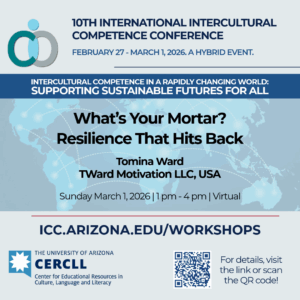 presented by Tomina Ward (TWard Motivation LLC)
presented by Tomina Ward (TWard Motivation LLC)
Sunday March 1, 2026 | 1:00pm – 4:00pm MST
This session empowers educators to integrate resilience-building, empathy, and intercultural competence into their teaching. Participants will gain practical tools to foster global citizenship, address interconnected crises, and guide learners toward creating sustainable futures.
Abstract:
Educators today face an urgent need to prepare learners for a rapidly changing world marked by ecological, social, and geopolitical crises. Meeting this challenge requires more than “education as usual”; it demands transformative approaches that cultivate resilience, intercultural competence, and a global mindset. This session explores practical strategies for integrating these capacities into language and content teaching, equipping educators to help students navigate uncertainty while contributing to a sustainable future.
Drawing on principles of intercultural communicative competence, the session positions resilience as a critical component of global citizenship education. Resilience enables learners to adapt to cultural differences, persist in the face of challenges, and engage constructively with diverse perspectives. When combined with empathy and intercultural awareness, it forms the foundation for inclusive, collaborative problem-solving across linguistic and cultural boundaries.
Participants will be introduced to a framework that blends resilience-building practices with pedagogical approaches aligned to Sustainable Development Goal 4.7, which calls for education that fosters global citizenship and sustainable development. The session will demonstrate how to embed reflective practices, mindset training, and experiential learning activities into the classroom, enabling students to connect language learning with real-world global issues. The workshop component will guide educators through activities adaptable for both physical and virtual classrooms, such as structured intercultural dialogues, scenario-based learning, and community engagement projects. These approaches are designed to encourage students to see themselves as active contributors to systemic change, not just passive recipients of knowledge.
By the end of the session, participants will have:
- A clear understanding of the relationship between resilience, intercultural competence, and sustainable development;
- Practical tools and classroom activities to foster these skills in learners;
- Strategies to adapt these approaches for varied contexts and learner needs.
Ultimately, this session invites educators to reimagine their professional practice as a vehicle for
transformative education—one that empowers learners to thrive in diversity, address interconnected
global crises, and actively shape a more sustainable world for all.
For full workshop details please visit: https://icc.cercll.arizona.edu/workshops/
You can also register for the workshop(s) alone, if you don’t want to attend the rest of the conference.
Participants can request a certificate of attendance for 3 hours of Continuing Education for this workshop.
➣➣Visit the ICC website for full details:
http://icc.cercll.arizona.edu
ICC 2026 is hosted by the Center for Educational Resources in Culture, Language and Literacy (CERCLL) and co-sponsored by the College of Humanities at The University of Arizona, Second Language Acquisition and Teaching (SLAT) Program, College of Social and Behavioral Sciences , Arizona International, UArizona Center for East Asian Studies, Center for Latin American Studies, and Center for Middle Eastern Studies, all at The University of Arizona; and by CALPER-Center for Advanced Language Proficiency Education and Research at Pennsylvania State University, the Center for Advanced Research on Language (CARLA) at the University of Minnesota, Center for Applied Second Language Studies (CASLS) at the University of Oregon, and the National Foreign Language Resource Center (NFLRC) at the University of Hawaii at Manoa.

